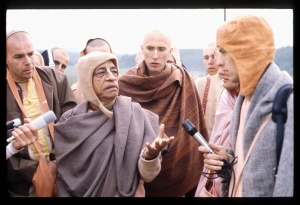CC Madhya 20.173 (1975): Difference between revisions
(Vanibot #0027: CCMirror - Mirror CC's 1996 edition to form a basis for 1975) |
(Vanibot #0020: VersionCompareLinker - added a link to the Version Compare feature) |
||
| Line 2: | Line 2: | ||
<div style="float:left">'''[[Sri Caitanya-caritamrta (1975)|Śrī Caitanya-caritāmṛta (1975)]] - [[CC Madhya (1975)|Madhya-līlā]] - [[CC Madhya 20 (1975)|Chapter 20: Lord Śrī Caitanya Mahāprabhu Instructs Sanātana Gosvāmī in the Science of the Absolute Truth]]'''</div> | <div style="float:left">'''[[Sri Caitanya-caritamrta (1975)|Śrī Caitanya-caritāmṛta (1975)]] - [[CC Madhya (1975)|Madhya-līlā]] - [[CC Madhya 20 (1975)|Chapter 20: Lord Śrī Caitanya Mahāprabhu Instructs Sanātana Gosvāmī in the Science of the Absolute Truth]]'''</div> | ||
<div style="float:right">[[File:Go-previous.png|link=CC Madhya 20.172 (1975)|Madhya-līlā 20.172]] '''[[CC Madhya 20.172 (1975)|Madhya-līlā 20.172]] - [[CC Madhya 20.174 (1975)|Madhya-līlā 20.174]]''' [[File:Go-next.png|link=CC Madhya 20.174 (1975)|Madhya-līlā 20.174]]</div> | <div style="float:right">[[File:Go-previous.png|link=CC Madhya 20.172 (1975)|Madhya-līlā 20.172]] '''[[CC Madhya 20.172 (1975)|Madhya-līlā 20.172]] - [[CC Madhya 20.174 (1975)|Madhya-līlā 20.174]]''' [[File:Go-next.png|link=CC Madhya 20.174 (1975)|Madhya-līlā 20.174]]</div> | ||
{{CompareVersions|CC|Madhya 20.173|CC 1975|CC 1996}} | |||
{{RandomImage}} | {{RandomImage}} | ||
==== TEXT 173 ==== | ==== TEXT 173 ==== | ||
| Line 13: | Line 12: | ||
:vidhinābhihitena te | :vidhinābhihitena te | ||
:yajanti tvan-mayās tvāṁ vai | :yajanti tvan-mayās tvāṁ vai | ||
:bahu- | :bahu-mūrtyeka-mūrtikam | ||
</div> | </div> | ||
| Line 27: | Line 26: | ||
<div class="translation"> | <div class="translation"> | ||
" 'In different Vedic scriptures, there are prescribed rules and regulative principles for worshiping different types of forms. When one is purified by these rules and regulations, he worships You, the Supreme Personality of Godhead. Although manifest in many forms, You are one.' | |||
</div> | </div> | ||
| Line 34: | Line 33: | ||
<div class="purport"> | <div class="purport"> | ||
This verse is quoted from Śrīmad-Bhāgavatam ([[SB 10.40.7]]). In the Vedas it is stated that the one becomes many (eko bahu syām). The Supreme Personality of Godhead expands Himself in various | This verse is quoted from Śrīmad-Bhāgavatam ([[SB 10.40.7|10.40.7]]). In the Vedas it is stated that the one becomes many (eko bahu syām). The Supreme Personality of Godhead expands Himself in various forms-viṣṇu-tattva, jīva-tattva and śakti-tattva. | ||
According to the Vedic literatures, there are different regulative principles for the worship of each of these forms. If one takes advantage of the Vedic literatures and purifies himself by following the rules and regulations, ultimately he worships the Supreme Personality of Godhead, Kṛṣṇa. Kṛṣṇa says in | According to the Vedic literatures, there are different regulative principles for the worship of each of these forms. If one takes advantage of the Vedic literatures and purifies himself by following the rules and regulations, ultimately he worships the Supreme Personality of Godhead, Kṛṣṇa. Kṛṣṇa says in Bhagavad-gītā ([[BG 4.11 (1972)|4.11]]): mama vartmānuvartante manuṣyāḥ pārtha sarvaśaḥ. Worship of the demigods is in a sense worship of the Supreme Personality of Godhead, but such worship is said to be avidhi-pūrvakam, improper. Actually demigod worship is meant for unintelligent men. One who is intelligent considers the words of the Supreme Personality of Godhead: sarva dharmān parityajya mām ekaṁ śaraṇaṁ vraja. One who worships demigods worships the Supreme Lord indirectly, but according to the revealed scriptures, there is no need to worship Him indirectly. One can worship Him directly. | ||
</div> | </div> | ||
Latest revision as of 12:48, 27 January 2020

A.C. Bhaktivedanta Swami Prabhupada
TEXT 173
- anye ca saṁskṛtātmāno
- vidhinābhihitena te
- yajanti tvan-mayās tvāṁ vai
- bahu-mūrtyeka-mūrtikam
SYNONYMS
anye—different persons; ca—also; saṁskṛta-ātmānaḥ—persons who are purified; vidhinā—by the regulative principles; abhihitena—stated in the revealed scriptures; te—such persons; yajanti—worship; tvat-mayāḥ—being absorbed in You; tvām—You; vai—certainly; bahu-mūrti—having many forms; eka-mūrtikam—although one.
TRANSLATION
" 'In different Vedic scriptures, there are prescribed rules and regulative principles for worshiping different types of forms. When one is purified by these rules and regulations, he worships You, the Supreme Personality of Godhead. Although manifest in many forms, You are one.'
PURPORT
This verse is quoted from Śrīmad-Bhāgavatam (10.40.7). In the Vedas it is stated that the one becomes many (eko bahu syām). The Supreme Personality of Godhead expands Himself in various forms-viṣṇu-tattva, jīva-tattva and śakti-tattva.
According to the Vedic literatures, there are different regulative principles for the worship of each of these forms. If one takes advantage of the Vedic literatures and purifies himself by following the rules and regulations, ultimately he worships the Supreme Personality of Godhead, Kṛṣṇa. Kṛṣṇa says in Bhagavad-gītā (4.11): mama vartmānuvartante manuṣyāḥ pārtha sarvaśaḥ. Worship of the demigods is in a sense worship of the Supreme Personality of Godhead, but such worship is said to be avidhi-pūrvakam, improper. Actually demigod worship is meant for unintelligent men. One who is intelligent considers the words of the Supreme Personality of Godhead: sarva dharmān parityajya mām ekaṁ śaraṇaṁ vraja. One who worships demigods worships the Supreme Lord indirectly, but according to the revealed scriptures, there is no need to worship Him indirectly. One can worship Him directly.